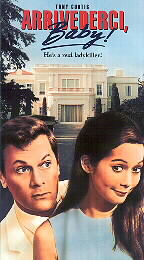
ARRIVIDERCI BABY
US, 1966, 100 minutes, Colour.
Tony Curtis, Rosanna Schiaffino, Lionel Jeffries, Zsa Zsa Gabor, Nancy Kwan, Fenella Fielding, Anna Quayle, Noel Purcell, Warren Mitchell, Mischa Auer.
Directed by Ken Hughes.
Arrivederci Baby (Drop Dead Darling) is a black comedy with Tony Curtis as a writer who wants to get rid of his wives for their money. When he marries Francesca (Rosanna Schiaffino) she intends to kill him. This leads to a comedy of errors. In support are a great number of British comedians including Lionel Jeffries, Fenella Fielding, Anna Quayle and Warren Mitchell. Zsa Zsa Gabor is also on hand.
The film was directed by Ken Hughes. After directing a number of small British films during the 1950s (Time Slip), he made a successful film about Oscar Wilde starring Peter Finch, The Trials of Oscar Wilde (1960). During the 1960s he made some more significant films including the Kim Novak version of Of Human Bondage, contributed to Casino Royale, directed Chitty Chitty Bang Bang and Cromwell with Richard Harris and Alec Guinness. He was only to make a few films after this in the 70s including the bizarre Mae West film, Sextet.
The film was of interest of South African-born playwright, Ronald Harwood. He wrote his first screenplay in 1962 for Private Potter with Tom Courtney. He also wrote A High Wind in Jamaica. He continued writing many films during the 1970s but emerged in 1983 with the Oscar-nominated The Dresser. During the 1990s he also had success with new versions of The Browning Version and Cry the Beloved Country. However, he came into his own at the beginning of the 21st century with a film version of his play Taking Sides as well as an Oscar for best screenplay for Roman Polanski’s The Pianist. He also wrote the version of Brian Moore’s The Statement, Szabo’s Being Julia and the screenplay for Roman Polanski’s version of Oliver Twist.
1. How successful a comedy was this? Why?
2. The film was a satire and a black comedy. Which were its best satirical aspects? Why was it a black comedy? Joking about life and death, crime, using of people and money?
3. How was Rick Johnson an interesting central chameter? The fact that it was his autobiography? How sympathetic was Tony Curtis? As a callow criminal? Was his background sufficient explanation for him? How enjoyable and satirical was the background?
4. How successful were these satirical flashbacks? As explaining Nick and his criminal bent? Aunt Miriam and her infatuation? The satire on orphanages? Her sexual infatuation with Nick? The satire in Anna Quayle?
performance? The exaggeration? The melodramatic jealousy and murder? The contrast with Zsa Zsa Gabor and her incessant talking? The outlandish humour of her rocket misadventure? The fact that aristocracy are not everything? The contrast with satire on English aristocracy and hunting? The unsociable hunting? The gore of hot
death and yet the audience was laughing? What effect does this kind of black humour hue on the audience? is it really laughing?
5. How farcical was the whole film? Lyrics, fitting with the tone of its ending? Or did the ending clash with what Abed gone before?
6. How interesting are confide the tricksters? Audience in participation in the confidence tricks and audience sympathy for the trickster? the use of the Bluebeard background for this film? Was it over serious in its themes? Was it serious in its comic presentation of a Bluebeard trickster?
7. How interesting was the character of Francesca? Her marriages? The satire of the old man on the marriage day? Was her background equal to Rick Johnson’s? The irony of their both trying to trick each other? The irony of their immorality? Lust and love? On money and death?
8. The role of Parker? Objectively objectionable as a panderer to Rick Johnson? Comic because of Lionel Jeffries’ style? And the parody of English manners?
9. What insight into love, money, greed, did the film give?
10. The irony of the sequence where both Francesca and Rick tried to blow each other up? How did this explode the previous atmosphere of the film and change its tone?
11. What did Baby and Morrie add to the film?
12. What did the film have to say about love, life, and cynical corrunent on the manner and morals of the time?